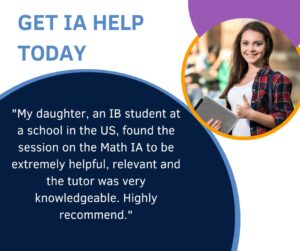What you need to know to help get a top-scoring IA
IA Help! If you are a pre-IB student, in the first year of the IB, or struggling to get it finished then it’s likely that you’ll have some worries about your IAs.
“How do I get started on my IA?”
“I’m stuck on my IA – what do I do now?”
“I’m worried that I won’t get it done.”
“How do I write an IA with top marks?”
“Which question should I choose to get the best marks in my IA?”
These are just some of the common questions we hear from stressed-out IB students worried about their IA, so you are not alone. In this article, we have worked with our experienced IB teachers and examiners to answer these questions and more.
Note – this article relates to the the syllabus with last examinations in 2024.
Getting started on the IA or finally completing your research and writing it up can feel overwhelming at times.
Our IA specialist tutors are just a click away, get in touch for help today. At TutorsPlus we are here to help, and this article gives you tips to help you.
The IA essentials
Firstly, the IA or Internal Assessment can be an oral, a piece of written work, a project, labs, and practical experiments, it all depends on the subject. The goal is to show that the student is able to demonstrate the assessment criteria in relation to the question identified.
In parallel to the Theory of Knowledge and Extended Essay, Internal Assessments (teacher assessments) are also used for most courses, which include:
- oral work in languages
- fieldwork in geography
- laboratory work in the sciences (chemistry, biology, physics)
- investigations in mathematics
- artistic performances
Secondly, the Internal Assessment subject teacher marks the IAs (internally) and then they are externally moderated by the IB at the end of the course and count toward the final IB score for the diploma. The criteria for evaluating this type of assignment are as follows:
- Knowledge and understanding
- Application and analysis
- Synthesis and evaluation
- Select, use and apply a variety of appropriate skills and techniques
Thirdly, you prepare it in advance and it accounts for a significant percentage of your final mark (although it differs depending on the subject). This means with some preparation and hard work you can have marks in the bank before you even walk into an exam hall. You can click here if you need a little extra help.
With the IA you know the question being posed, you have time to work on it in advance, and this helps you to get the best possible IA grade.
Isn’t it worth working hard at it? It may even take the pressure off a little at exam time!
Marking and moderation
At the outset, it is important to note that there are two types of assessment: internal and external. Both the Extended Essay and the Theory of Knowledge essay are external since like your exams, they are sent to IB examiners for grading. Instead, your class teacher will mark your IA. Then a sample is sent off to the IB for moderation by one of their examiners. Then the marks of the class are adjusted in line with the grade changes needed for the samples submitted. This approach is designed to avoid grade inflation.
Your IA will be marked according to a mark scheme that your teacher has probably already shared with you. If you haven’t got it yet they are available in the IB Subject Guides. Learning where to pick up marks and avoid dropping them will be key to you writing a successful IA.
Criteria-based marking is used by the IB, meaning points are given according to mark bands. These are typically between 0 and 3, with 0 indicating none of the criteria have been met and 3 that they have all been met.
Furthermore, if you want to do a deep dive into how moderation works at the IB, here are the key principles;
- If the teacher is consistently under- or over-marking, this adjustment will be the same for each of the teacher’s marks.
- If the teacher is under- or over-marking either at the top or bottom of the mark range, the adjustment may vary across the range of the marks.
- If the teacher is marking to the correct standard no adjustment will be made.
(Extract p237, Assessment Principles and Practises report IBO, 2018)
Use the marking criteria to improve your IA score
Inform yourself by looking at past IAs. Your teacher will probably share examples with you, so make sure you review them against the marking criteria. Above all, try to understand for yourself why one IA has scored the maximum possible points and why another has not scored so well. This will allow you to think about how you will apply these insights to your own IA to improve the score.
Make sure you have the marking criteria with you whenever you are working on your IA, and this will help you ensure your work is addressing every point as you go along. Then you can keep checking back in to see that you are on track to deliver what the IB examiners are asking for and that all criteria are being met. You don’t want to be leaving valuable points on the table by not addressing even one of the marking criteria.
Each time you have completed an element of the IA, look at it critically and ask yourself how many marks would an examiner award? You can even get a friend to do this for you. Then see what you would need to add or change to secure all the allocated marks.
Academic honesty and the IA
Students know that academic honesty is an essential element of independent research, but some aren’t so clear on why. So here we are going to take a look at why the IB states this is so important. (“Academic honesty in the IB educational context”, International Baccalaureate Organisation, 2014) The same document also goes on to explain why citing your sources is so important:
“Proper citation is a key element in academic scholarship and intellectual exchange. When we cite we:
- show respect for the work of others
- help a reader to distinguish our work from the work of others who have contributed to our work
- give the reader the opportunity to check the validity of our use of other people’s work
- give the reader the opportunity to follow up our references, out of interest
- show and receive proper credit for our research process
- demonstrate that we are able to use reliable sources and critically assess them to support our work
- establish the credibility and authority of our knowledge and ideas
- demonstrate that we are able to draw our own conclusions
- share the blame (if we get it wrong). ”
Plagiarism, whether intentional or not, is serious and can result in the student not being awarded their IB diploma.
Moreover, always, always, always keep track of your sources as you go. Use a citation generator is a quick way of doing this. There are good free ones available, and they will save you a lot of time. Students often use search engines that can throw up reliable and not-so-reliable sources. With that in mind, we strongly recommend using the CRAP test (currency, reliability, authority, and purpose) that determines whether a website is a credible source or not.
How to choose your IA question
The best advice we can give is to choose a topic and question that really interests you and one that you have passion for. This will make your IA seem fresh, unique, and interesting when it is being marked. This way you will also naturally have more enthusiasm to work on it and feel comfortable investing more time in a subject you enjoy.
At the same time, it is worth looking for topics that will be new and interesting to the examiners, as they see the same questions again and again, year after year. Although it won’t count for any marks in itself, it is likely to impress teachers and examiners who have become jaded by seeing the same topic rehashed in so many different ways.
At TutorsPlus our IB teachers can help you think through your topic options, helping you identify an area with the potential for you to ace your IA. They can use their experience to support you in defining a question you will be passionate about and above all engaged in.
Finally, trying to find a unique angle that really motivates you in your independent work will also help it stand out from your peers and get you as close to the top IA grades as possible.
Start early and keep to deadlines
At TutorsPlus we sometimes get calls from desperate students who have left their IA to the last minute. Invariably this means they have lost the chance to maximise their marks, but it is never too late to improve!
We strongly recommend you keep to the timings that your teachers have given. They have organized the deadlines carefully, so you don’t have too much work to do at any given point.
If you don’t manage to keep to their recommended timings, you will end up having to work on multiple complex assignments at once and won’t have the chance to hand in your best IA and secure the top marks that you were hoping for.
Get organized and start early!
Do whatever it takes to keep yourself on track. Plan your time well and realistically. Have an IA buddy and pair up to help keep each other on time. Two years might feel like a long time but there is so much work to do, it is vital that you keep to the deadlines.
It is also essential you complete your IA before your second IB year. We have seen too many rushed IAs that are completed in IB2. By the end of the summer following your IB1 year, your IA should be complete and ready to hand in.
Ask for IA Help!
If you get behind, don’t stick your head in the sand. It is never too late.
Ask for help. Talk to your peers, parents, teacher, or IB Coordinator. Get in touch with TutorsPlus we have expert IB teachers and examiners who can help.
From experience, we can also promise you that it is better to ask for help sooner rather than later. This will save potentially wasted time caused by working on a poorly chosen topic, going too far without answering the question, ending up in a dead-end, or spending time on irrelevant research taking you off on a tangent.
Is English your second language?
Often students for whom English is a second or third language find the written format of IAs more challenging.
If this is the case for you, ask for help, as you may need to allow more time to complete the work. One of our tutors or a learning support teacher at school may be able to help you with your English written expression. It is certainly worth asking for help from a native speaker to check the language for errors before you hand in your final draft.
Most schools have EAL teachers or learning support staff who can help you. We also have specialist IB teachers who help students with the English language aspect of IAs.
How can we give you IA Help?
Whether your IA is just at the start and you are thinking about your question or part-way through, even just a few hours with an expert IB teacher or examiner can make a huge difference.
Among others, you can expect a TutorsPlus tutor to:
- Help create a well-thought-through research question and an effective plan to tackle it.
- Explain how to quickly and easily cite sources.
- Help students identify problem areas in their IA and help them find their own solutions.
- Revise the parts of the syllabus relevant to your child’s topic. Often this can provide just the recall needed to prompt them to move forward.
- Draw attention to problem areas and guide students to find their own solutions.
- Encourage a level of reflection, analysis, and critique expected from the IB Diploma. This will help to move towards the requirements of a top-scoring IA.
- Support students to confidently approach academic learning, research, and
- Help boost confidence.
TutorsPlus offer pre-IB tuition in all subjects to help international students prepare for this demanding programme.
Our tutors know the IB inside-out and truly work magic to draw out each student’s ability to self-direct their learning. You can reach TutorsPlus at 022 731 8148 or info@tutorsplus.com
By Sara Lloyd
Sara has been an education consultant for TutorsPlus for 15 years, and is an expert on international IB education. She is also a parent of two lively children.













